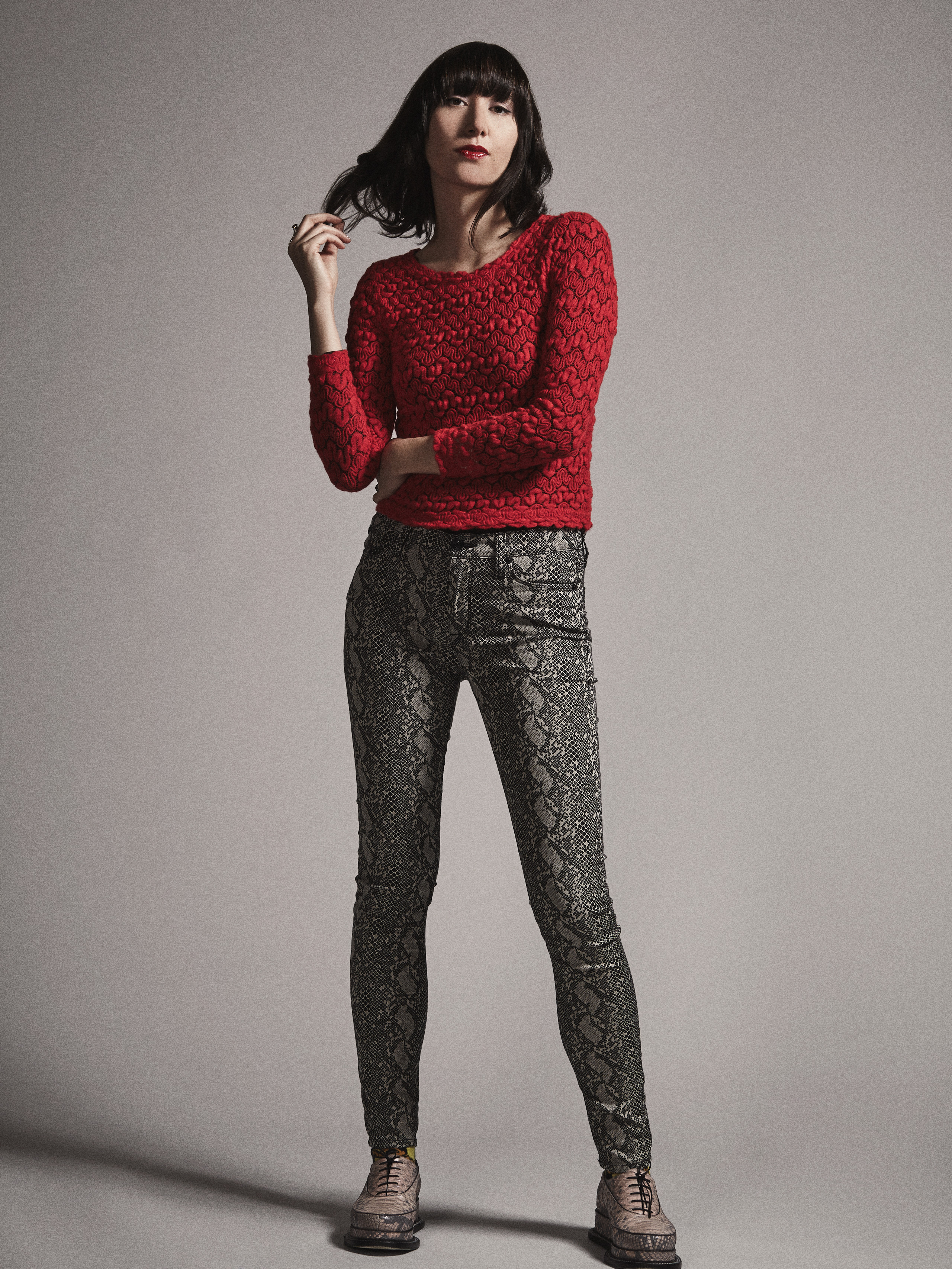‘Crush Songs’ is a deeply personal record, from its subject matter (real life infatuations with four boys of note, including the man O would go on to marry in 2011) to its pimply, unprocessed presentation and lone acoustic guitar. Some of the tracks were pretty much written as she sings them; most refuse to repeat themselves like conventional pop songs do. Just as they get going, they fade to nothing. They are without flesh and skin, because they were never intended to be heard by anyone else, just as a diary writer doesn’t make pretty letters that live under the bed.
It’s hardly the record that anyone was expecting from the new millennium’s Iggy Pop, and accordingly it’s left some fans frustrated. Part of that stems from what we consider Karen O to be, versus the shy, unassuming woman who arrives at our photo shoot completely alone and suspiciously punctual. But it’s also down to the unfulfilled potential of some of these songs. ‘Visits’, ‘Day Go By’, ‘Native Korean Rock’ and the particularly faint, closing ‘Singalong’ all feature melodies that are beautiful but fleeting. Presumably, a track like ‘Maps’ started out in a similar way, and look how well that turned out once it was given a good meal.
“Yes, totally. I was going back and forth, vacillating on that,” she says when I ask if taking these old demos into a studio to rerecord them had ever crossed her mind. “But I feel like my intentions for putting them out more produced were just not pure. They were things like, ‘because it would be more accessible,’ or, ‘because more people would enjoy it’, it wasn’t like, ‘because it’ll sound so much better’ – it was more like thinking about it from a commercial standpoint, and it’s like, fuck that, y’know? So I’d think about it but always ping-pong back to, ‘ah, fuck it’.”
Karen says she asked a few friends what they thought, including Dave Pajo, Slint guitarist and a touring member of Yeah Yeah Yeahs since 2009. In February of the same year that Pajo joined the band he released a lo-fi album of Misfits covers played on an acoustic guitar. ‘Scream With Me’ left an impression on O, who admired the record’s simple beauty and good humour. Once it was her turn to potentially release something even more skeletal, Pajo was a strong supporter of leaving the tracks well alone.
“Beyond all of that, you just don’t get this kind of stuff,” says O, sat on the roof of West London ballroom, Bush Hall. “These songs, it wasn’t me trying to write a song; it was me working through emotions and feelings and love shit and life. And a lot of them, what you’re hearing is the first time I’m even putting it down. It’s so raw and authentic, and there’s a primacy to them that I don’t feel that you hear so much. It’s not a common thing, and when I listen to them now they transport me back to those moments, and I felt like there’s nothing that I can reproduce in a studio that can give me that same feeling.”
“A lot of things get lost in translation with Yeah Yeah Yeahs,” she says. “Demo love, y’know, it’s a real thing, and a lot of people are stricken with it. We do demos and I don’t know if we ever capture the same feel and essence of the demo in the produced version, but, y’know, we can’t really put out a bunch of demos. So this was refreshing, to be able to do that.”
But there are moments on ‘Crush Songs’ that you want a little more of; there are melodies, in particular, that you want to hear more than once.
“But that’s the other cool thing about it,” she insists. “They’re like… what’s the word…? fuck… They’re kind of like haikus or something, because it’s kinda nice that they’re so short and that I haven’t embellished them, because really, in the end, you don’t need any more than is there, because I think I’ve got the point across. I’m not a waffler – writing lyrics is like getting blood out of a stone for me, so once I get it, [clicks fingers] there it is. That’s actually harder to do than jam out for a while, for a lot of people, but for me, it’s generally my style to keep it as simple and pure and to the point.
“I think a lot of people were thinking it was going to be a banging dance-pop record, because that’s what a lot of gals do when they break off and do their solo thing, but I wanted to make it clear that it was this lo-fi, small, personal, quiet record. I think I got that across alright, but that was important, because there’s always expectations. I didn’t feel that the world needed another dance-pop Karen O record – that’s the last thing the world needs, actually.”
